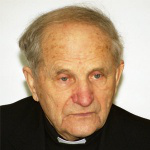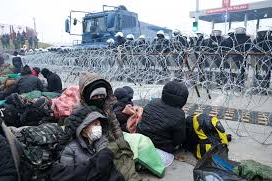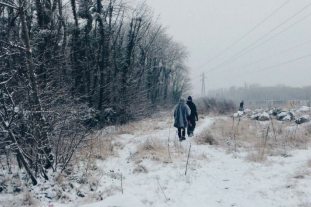Belarus: Cardinal who survived the gulag has died

Cardinal Kazimierz Swiatek
The head of a UK Catholic charity has paid tribute to Belarus' Cardinal Kazimierz Swiatek, who died on Thursday at the age of 96.
Aid to the Church in Need (UK)'s national director, Neville Kyrke-Smith, praised the former Church leader, who was sentenced to death and spent almost a decade imprisoned in the Soviet gulags - becoming the only priest of his diocese to survive the communist persecution.
He described the Cardinal, who he met on an Aid to the Church in Need trip to Belarus in 1999, as "a remarkable figure of the 20th century, a real hero of Faith".
Mr Kyrke-Smith recalled how the Cardinal told him that he came close being killed twice.
"He'd faced death at the hands of the Nazis and the Soviets but in both cases he escaped. He said God had other plans for him."
In April 1941, as a young assistant priest, he was arrested by the NKVD (Soviet secret police) and sentenced to death, spending two months in the death cell in a prison camp in Brest, a city in modern-day Belarus, close to the border with Poland. But he escaped execution, being set free when the German army pushed forward into the Soviet Union.
Until the end of the German occupation Fr Swiatek worked as parish priest in Pruzana, near Brest, remaining there even after it was occupied by the Red Army. But in December 1944 he was arrested again and in July 1945 was sentenced to 10 years' forced labour in Maryinsk gulag.
In an interview with Aid to the Church in Need Cardinal Swiatek said: "It was a death sentence. We worked in temperatures down to minus 40 degrees, felling timber, and slept as many as 300 people at a time, in a Semlanka - a hole in the ground with a makeshift covering - without any light and without anything.
"They told us a bullet would be wasted on us, since we would die here anyway, and so until then we could carry on working. Exhaustion, hunger and cold brought death to many.
"In the mornings, before we began work, the dead were thrown out into the snow. The wolves came in the night and ate up the bodies. When they saw I was still alive after three years, they sent me to Vorkuta. There it was winter for 12 months of the year."
After the death of Stalin in 1954, he was released and went to work as parish priest in Pinsk.
Asked by Mr Kyrke-Smith how his faith had survived after everything he had been through, the Cardinal replied: "If you believe in God, and God is in you, you can do everything. It is very simple."
In 1991, after Belarus became independent from the Soviet Union, Fr Swiatek was appointed Archbishop of Minsk-Mohilev and Apostolic Administrator of Pinsk by Pope John Paul II, being made a Cardinal in 1994.
Mr Kyrke-Smith also recalled how Cardinal Swiatek spoke about "the Chernobyl of the soul. People asked him if he was worried about Chernobyl, but he said he was more concerned with the Chernobyl of the soul - the post-communist spiritual vacuum in the country," said Aid to the Church in Need (UK)'s national director.
Following the political changes in 1991, Aid to the Church in Need responded to his requests for help with a number of different projects, including the renovation of the seminary in Pinsk and the cathedral in Minsk.
Mr Kyrke-Smith spoke of the Cardinal's key role in building up the Catholic Church after the fall of communism. He said: "He was a father to his priests and there is a sense of a large family about the Catholic Church in Belarus that is thanks to him.
"His pastoral touch and fortitude of Faith sustained the church in that part of the Soviet Union and sustained his priests as Belarus emerged from communism - and even afterwards it continued to be difficult situation for the Catholic Church - but he led it with strength and Faith."
Cardinal Swiatek was born on 21 October 1914, into a Polish family in Valga, Estonia.
His father died in 1920 in the Polish-Russian war, defending the city of Vilnius against the Bolsheviks, and while still a child he was deported to Siberia, along with his mother and siblings, not returning until 1922.
At the age of 18 Kazimierz Swiatek entered the seminary of Pinsk, which at that time was still in Poland, and was ordained to the priesthood on 8th April 1939.
In April 1941, as a young assistant priest, he was arrested by the NKVD and sentenced to death, spending two months in the death cell in a prison camp in Brest, where some 7,000 Poles were imprisoned. He escaped execution, being released when the German pushed forward into the Soviet Union.
Until the end of the German occupation he worked as a parish priest in Pruzana, near to Brest, remaining there even after it was occupied by the Red Army. In December 1944 he was arrested again and in July 1945 he was sentenced to 10 years forced labour in the notorious labour camps of Maryinsk and Vorkuta.
After the death of Stalin, in 1954, he was released and went to work as parish priest in Pinsk. In 1991, after the country became independent from the Soviet Union, Fr Kazimierz Swiatek was appointed Archbishop of Minsk-Mohilev and Apostolic Administrator of Pinsk by Pope John Paul II, being made a Cardinal in 1994.
Cardinal Swiatek was awarded the Fidei Testis (Witness to the Faith) prize by Pope John Paul II in September 2004,
In 2006, at the age of 92, Cardinal Swiatek retired as Archbishop of Minsk-Mohilev.


















